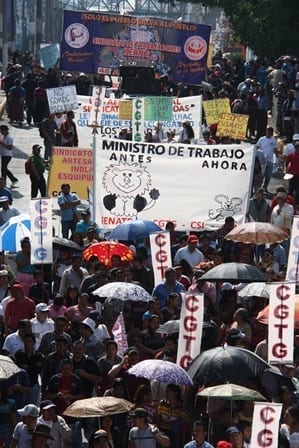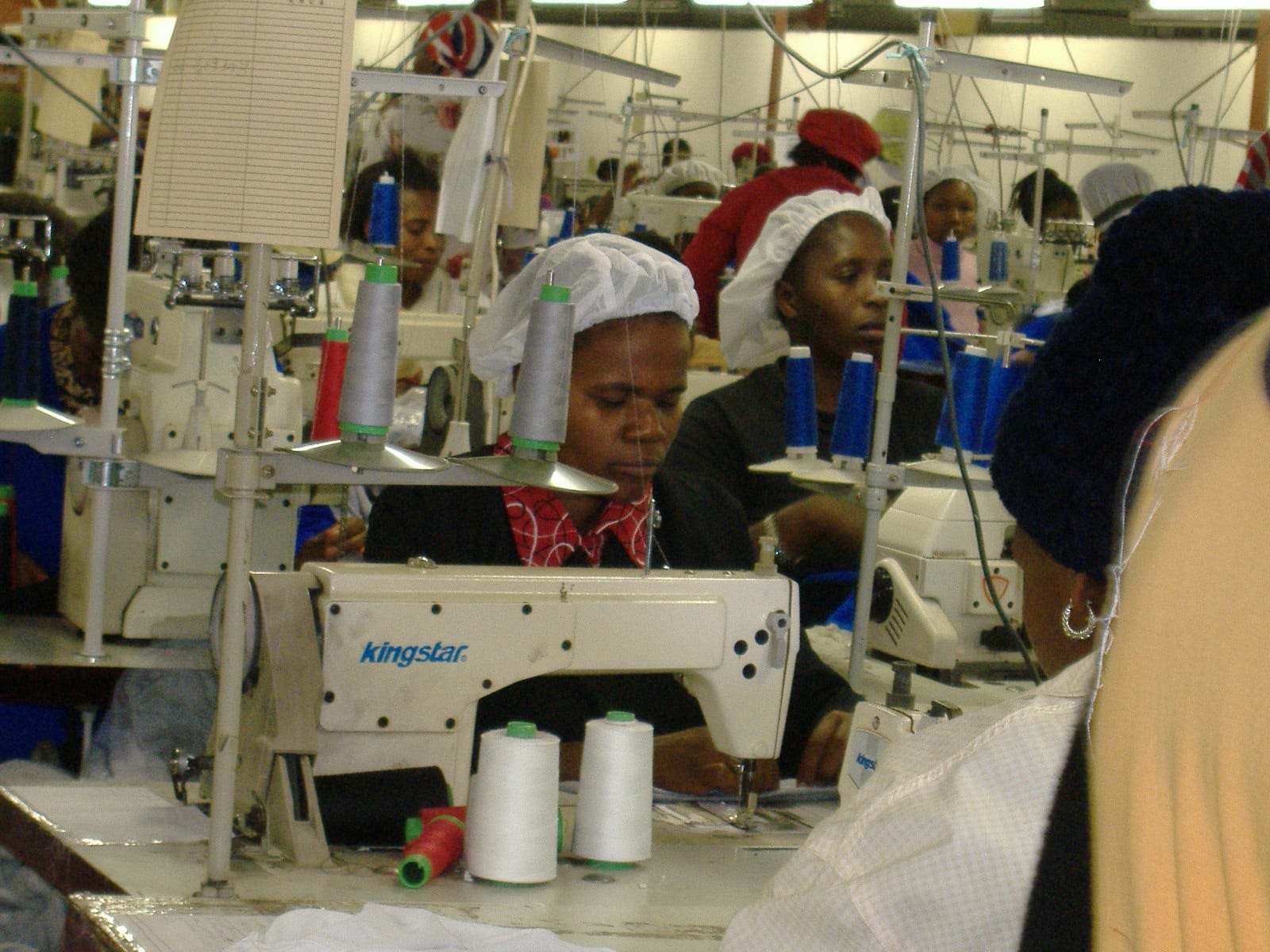Aug 5, 2014
African trade union leaders from across the continent called on U.S. and African leaders to adopt a decent work agenda for trade and economic growth where the creation of good jobs that respect worker rights and provide social protections will lead to greater shared prosperity.
Union leaders discussed issues regarding jobs, development and investment at an official U.S.-Africa Leaders’ Summit workshop yesterday: “Promoting Decent Work: Priorities for U.S. and African Leaders, Civil Society and Private-Sector Shareholders.” Their recommendations, which include a focus on gender equality, will be submitted to the African heads of state also meeting this week in Washington, D.C.
The panel discussion highlighted the reality that although many countries in sub-Saharan Africa are seeing tremendous economic growth through oil and mineral exports, the emergence of a textile sector and expanding foreign investment, workers and their families are not sharing in the prosperity. Indeed, in many sub-Saharan African countries, the majority of workers toil in the informal economy, leaving them vulnerable to economic shocks, without social protections and with limited ability to transition into formal employment—and often trapped in a multigenerational cycle of poverty.
Sahra Ryklief, secretary general of the International Federation of Workers’ Education Associations (South Africa), said: “Why do we promote decent work? Because if we don’t, we are headed for disaster. For a worker who does not have a steady income, life is precarious. And Africa has 80 percent of the population in informal work–many of them women. So many that they have come to be known as the ‘precariat.’”
To combat this problem and the gross inequality that it engenders, Kwasi Adu-Amankwah, Secretary General of the International Trade Union Confederation-Africa called for focused strategies that industrialize national economies and create better, formal-sector jobs. Formal livelihoods that provide real wages and a decent standard of living, he argued, are key to lifting up the working poor. In addition, the wealth generated through high levels of economic growth over the past decade should be reinvested in the African people via strong social institutions and investment in working women and men, through effective skills training programs.
Speakers also stressed the importance of extending social protections and worker rights to the majority of African workers in informal employment, to improve livelihoods and provide them equal protection under the law.
The workshop featured:
• Christopher Lu, U.S. deputy secretary of labor;
• Steven Feldstein, deputy assistant secretary of state, U.S. Department of State Bureau of Democracy, Human Rights and Labor;
• Kwasi Adu-Amankwah, general secretary, International Trade Union Confederation-Africa;
• Eric Biehl, associate deputy undersecretary for international affairs, U.S. Department of Labor, International Labor Affairs Bureau;
• Sahra Ryklief, secretary general, International Federation of Workers’ Education Associations; and
• Sabina Dewan, president and executive director, Just Jobs Network.
A set of recommendations will be publicly available soon.
Aug 1, 2014

Thousands of Guatemalans turned out on May Day this year to protest violence against union members and demand worker rights. Credit: Stephen Wishart
Guatemalan trade union leaders met with U.S. Trade Representative Michael Froman in Guatemala City today to express their frustration with the failure of the Guatemalan government to make any meaningful progress in protecting worker rights.
The meeting took place as Guatemala neared the deadline for complying with a “Labor Action Plan” it signed with the United States in April 2013. The United States granted Guatemala a four-month extension earlier this year. Guatemalan unions and the AFL-CIO first raised concerns about egregious labor rights violations in Guatemala in a joint complaint filed in 2008 under the Central American Free Trade Agreement (CAFTA).
The union leaders told Froman that the government has failed to improve worker rights since the complaint was filed six years ago and in fact, the situation for workers in Guatemala has deteriorated in recent years.
Seventy-two unionists have been murdered in Guatemala since CAFTA was implemented.
“One of the main challenges in achieving labor justice in Guatemala are the high levels of impunity and lack of accountability of those public officials responsible for ensuring respect for labor rights,” said Victoriano Zacarias, deputy general secretary of the Confederacion Central de Trabajadores de Guatemala (Central Confederation of Guatemalan Workers, CGTG).
“Moreover, the bills before Congress on labor issues in Guatemala, if approved, will result only in more labor rights violations and further facilitate greater migration to the U.S. for lack of basic conditions of labor rights.” Zacarias was among union leaders taking part in today’s meeting.
Another participant in the meeting, Carlos Mancilla, general secretary of theConfederacion Unitaria Sindical de Guatemala (United Trade Union Confederation of Guatemala, CUSG), said “the government of Guatemala has no political will to solve the existing labor problems.”
“The government of Guatemala has stated it has made advances, but the only progress has been creating roundtable discussions that have not provided solutions to labor problems, and the establishment of agreements and protocols that are not implemented.”
“This year, the International Trade Union Confederation (ITUC) named Guatemala the most dangerous place in the world to be a union leader,” said Solidarity Center Country Program Director Stephen Wishart, who attended the meeting. “So we’re pleased to see that Ambassador Froman is taking the issue of worker rights seriously and meeting with the unions to hear their side.”
Wishart said that Guatemalan unions will continue to press their government to live up to its labor rights commitments, and added, “The Solidarity Center will stand with our union partners in Guatemala as they keep up their fight for worker rights, safety and decent jobs for Guatemalan workers.”
Aug 1, 2014
 Nearly 40 trade union leaders from Africa are meeting in Washington, D.C., over coming days for a series of events to highlight the concerns and needs of working people throughout sub-Saharan Africa.
Nearly 40 trade union leaders from Africa are meeting in Washington, D.C., over coming days for a series of events to highlight the concerns and needs of working people throughout sub-Saharan Africa.
The meetings parallel the August 4-6 White House Summit for African heads of state, with union leaders seeking to influence public debate and hold leaders accountable over key issues such as decent jobs, social protections, gender equality and environmental sustainability.
On Monday, Liberian union leaders will take part in the panel “Trade Unions and Democracy from Below,” at the all-day “Empowered Africa” conference at Howard University, which is open to the public. Other events include forums on promoting decent work, inclusive development and a discussion on the Africa Growth and Opportunity Act (AGOA).
As a recent report by the AFL-CIO and Solidarity Center points out, in the 15 years AGOA has been in effect, it has increased exports from sub-Saharan Africa but has not spurred broader development or fostered a robust and equitable economic system.
Naome Chakanya, an economist with the Labor and Economic Development Research Institute of Zimbabwe (LEDRIZ) who will be among trade unionists in Washington, says workers are looking for “trade agreements which do not compromise the government’s ability to adequately provide social services (public goods) which include health, education, water, electricity.”
Trade agreements benefit African workers only if they include worker rights, social protection, employment creation and social dialogue, Chakanya says, listing the four elements that the International Labor Organization (ILO) defines as fundamental to decent work.
AGOA is due for reauthorization in September 2015. Reauthorization represents an opportunity to promote a coherent regional policy that benefits African workers and communities and addresses the challenges of a changing global economy. The White House Summit also includes an AGOA forum with finance and treasury ministers.
Achieving decent work also requires innovative approaches to addressing the informal economy, one of the key points in a new Solidarity Center report. Based on a 2013 survey of trade unionists in nine African countries, the report calls for worker associations and African governments to share experiences and invest more resources to empower workers in the informal economy and extend social protections to informal-sector workers, especially women. National and global economic trends suggest that more and more workers will seek to make a living in the informal economy in the face of fewer permanent, formal-sector jobs.
The report, “African Trade Unions and Africa’s Future: Strategic Choices in a Changing World,” also calls for enforcement of existing international worker rights standards. A broad body of international and national laws and standards protects workers and their rights, but they generally are not enforced, including by countries participating in programs like AGOA. As a result, workers are vulnerable to abuses such as unsafe and unhealthy workplaces, forced labor, lost wages, sexual harassment and workplace violence.
You can follow events throughout the week on Twitter with the hashtags #USAfrica, #AfricaSummit and #WeAreAfrica, and check back here for updates.
Jul 30, 2014
The United Nations today marks the first-ever World Day against Trafficking in Persons, created to raise awareness and highlight the plight of the millions of women, men and children who are trafficked and exploited, as well as to encourage people to take action to end the scourge.
Forced labor is the most common motive behind human trafficking, with more than 21 million people trapped in often slave-like conditions. Forced labor generates $51 billion per year in illegal profits, according to the International Labor Organization (ILO).
In the Dominican Republic, where tens of thousands of Haitians have been trafficked over decades to toil as domestic workers and sugarcane harvesters, the constitutional court ruled last September that children born to undocumented parents between 1929 and 2010 were not entitled to Dominican citizenship, effectively leaving up to 200,000 children and grandchildren of migrant workers without citizenship in the only country many of them have ever known.
Following international outrage, the country recently enacted a “regularization” plan that recognizes some 60,000 migrants with documents. But in practice, says Ana Maria Belique, “officials still reject our documents.” Belique, program director for the Bono Center, a Jesuit social and educational organization, took part in a recent migration advocacy training with labor and migrant activists organized by the Solidarity Center.
In the 1950s and 1960s, the Dominican Republic signed a series of agreements with Haiti that covered seasonal Haitian labor in the government-owned sugar industry.
But because the Dominican Republic did not fulfill its commitment to repatriate migrant workers, the migrant laborer agreements essentially became legal instruments for trafficking Haitian labor. Migrant workers were settled on sugar refining lands and had no access to health care or education. These impoverished settlements, known as bateys, became home to the families of migrants who did not or could not return to Haiti. The lack of legal status and statelessness are internationally identified indicators that increase workers vulnerability to forced labor and other forms of trafficking.
Rather than granting citizenship to the descendants of those trafficked for back-breaking work in sugarcane fields, the regularization plan requires that they provide proof of birth through testimony from a hospital, family member or priest before beginning the long process of “naturalization” with no guarantee of achieving residency. International law calls for children of migrants to automatically receive citizenship from the country where they were born.
The precarious situation of migrant workers under the laborer agreements allowed employers to put Haitian workers in conditions of forced labor through nonpayment of wages, restrictions on their freedom of movement, lack of health and safety regulations, lack of access to social services for migrants and their families and abusive working conditions. And as long as they are undocumented, migrants and their families are a source of low-wage labor.
“The international community should not be fooled by the Dominican government’s ill-named National Plan for Regularization and Naturalization,” says Eulogia Familia, vice president of the Confederaciün Nacional de Unidad Sindical (National Confederation of Labor Union Unity, CNUS). “It is a plan … to maintain them as a cheap labor force which is disenfranchised in the country they were born.”
CNUS and migrant worker rights organizations are working with the Solidarity Center to urge that the government recognize descendants of migrant workers as Dominican citizens in line with international standards for the rights of children. The Solidarity Center and its allies also are seeking to strengthen civil society protection for migrant workers through labor code reform and in coming months, will launch advocacy and visibility actions to raise awareness of the contributions to the Dominican Republic by Dominicans of Haitian descent and by all migrant workers.
The Dominican Republic is one of several countries where the Solidarity Center works to assist workers who have been trafficked, and is among dozens of countries where human trafficking takes place. You can show your support for victims of human trafficking by taking part in a UN-sponsored “thunderclap,” in which messages on a single topic are sent out through social media in a short timespan. By joining the thunderclap via Twitter, Facebook or Tumblr today, you can send a message expressing solidarity with human trafficking victims.

Jul 30, 2014
A recent survey by the Trade Union Congress of Swaziland (TUCOSWA) of more than 400 textile workers in Manzini, Swaziland, reveals that workers in the textile sector are subject to harsh and sometimes abusive conditions, many of the country’s labor laws are routinely violated by employers, and union activists are targeted by employers for punishment. (Download a PDF of this article.)
Surveys were collected by a team of five TUCOSWA union organizers from June 23–July 2, 2014. Workers from 18 of 28 textile companies in Manzini were represented in the survey and included sewing machine operators, pressers, quality controllers, packers, cleaners, trimmers, cutters and storeroom workers. The vast majority of respondents—94 percent—were women. And nearly a third of workers surveyed had post-secondary school education.
Notably, 91 percent of workers surveyed reported being punished by management for making errors, not meeting quotas or missing shifts. “I was a victim of physical abuse,” said one survey respondent. She is not alone. More than 70 percent of survey respondents reported witnessing verbal and physical abuse in their workplace by supervisors.
Some workers reported that supervisors slap or hit workers with impunity. In one example, a worker knocked to the ground by a line manager was suspended during an investigation of the incident while the line manager continued in her job.
Women reported instances of sexual harassment, as well. Several workers said they or other contract (temporary) workers were offered a permanent job in exchange for sex.
Nearly all workers—90 percent—reported having production quotas. Of these, more than 30 percent said they can never, or almost never, meet their quota, while more than 80 percent reported difficulty meeting their quota. According to the survey, punishments for not meeting quotas include suspension without pay, mandatory unpaid work through lunch breaks and verbal harassment.
Survey results also show that employer punishment of workers who are ill, injured or pregnant is common. More than 60 percent of workers said they knew someone who was fired for being sick or pregnant. Some respondents said any worker taking five sick days are automatically punished with three months forced unpaid leave.
The Swaziland Employment Act of 1980 guarantees maternity leave, prohibits termination for pregnancy and mandates 14 days paid sick leave per year under penalty to the employer of a fine or up to one year imprisonment.
Even though more than ninety percent of survey respondents believe a union would help them improve workplace conditions, survey responses show that most employers in the textile sector are hostile to unions. Eighty percent of respondents said their employer does not accept workers’ right to form a union while almost the same number reported knowing of union organizers, activists or leaders who were punished, fired or otherwise intimidated.
“Union members are victimized so I am scared to join,” said one worker.
Workers report that more than half of the clothing they produce is destined for U.S. and European stores.
In June 2014, Swaziland lost eligibility for benefits under the Africa Growth and Opportunity Act (AGOA) because the Swazi government had not demonstrated progress on the protection of internationally recognized worker rights, in particular, protecting freedom of association and the right to organize. The U.S. government, in announcing the rescinding of AGOA eligibility, also pointed out Swaziland’s “lack of legal recognition for labor and employer federations.”
TUCOSWA was formed in in January 2012 and registered by the Swazi government. The union federation was deregistered in April 2013, putting the government in violation of Convention 87 of the International Labor Organization Convention 87 which the government has ratified. Since deregistration intimidation of TUCOSWA leaders by government security forces has been widely reported, including arbitrary arrests, threats and assaults while in police custody.
.jpg) |
Safety Concerns @ Work:
Safety concerns: dust (causing respiratory problems), hot pipes, steam (causing burns), needle sticks, falling equipment and/or production materials.
Awareness:
Percent of workers who have seen other workers injured at work. |
.jpg) |
Aware of Union Intimidation:
Aware of union organizers, leaders, activists being punished, fired or otherwise intimidated. |
.jpg) |
Allowed Breaks:
No breaks during the day. Restroom breaks tightly controlled.Abused:
Verbal and physical abuse by supervisors.Job Loss due to Sickness or Pregnancy:
Workers who know of someone being fired for getting sick or pregnant. |




.jpg)
.jpg)
.jpg)
.jpg)